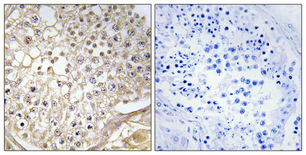PFK-C Polyclonal Antibody
- Catalog No.:YT3686
- Applications:WB;IHC;IF;ELISA
- Reactivity:Human;Mouse;Rat;Monkey
- Target:
- PFK-C
- Fields:
- >>Glycolysis / Gluconeogenesis;>>Pentose phosphate pathway;>>Fructose and mannose metabolism;>>Galactose metabolism;>>Metabolic pathways;>>Carbon metabolism;>>Biosynthesis of amino acids;>>RNA degradation;>>HIF-1 signaling pathway;>>AMPK signaling pathway;>>Thyroid hormone signaling pathway;>>Glucagon signaling pathway;>>Central carbon metabolism in cancer
- Gene Name:
- PFKP
- Protein Name:
- 6-phosphofructokinase type C
- Human Gene Id:
- 5214
- Human Swiss Prot No:
- Q01813
- Mouse Gene Id:
- 56421
- Mouse Swiss Prot No:
- Q9WUA3
- Rat Gene Id:
- 60416
- Rat Swiss Prot No:
- P47860
- Immunogen:
- The antiserum was produced against synthesized peptide derived from human K6PP. AA range:341-390
- Specificity:
- PFK-C Polyclonal Antibody detects endogenous levels of PFK-C protein.
- Formulation:
- Liquid in PBS containing 50% glycerol, 0.5% BSA and 0.02% sodium azide.
- Source:
- Polyclonal, Rabbit,IgG
- Dilution:
- WB 1:500 - 1:2000. IHC 1:100 - 1:300. IF 1:200 - 1:1000. ELISA: 1:5000. Not yet tested in other applications.
- Purification:
- The antibody was affinity-purified from rabbit antiserum by affinity-chromatography using epitope-specific immunogen.
- Concentration:
- 1 mg/ml
- Storage Stability:
- -15°C to -25°C/1 year(Do not lower than -25°C)
- Other Name:
- PFKP;PFKF;6-phosphofructokinase type C;6-phosphofructokinase; platelet type;Phosphofructo-1-kinase isozyme C;PFK-C;Phosphofructokinase 1;Phosphohexokinase
- Observed Band(KD):
- 84kD
- Background:
- This gene encodes a member of the phosphofructokinase A protein family. The encoded enzyme is the platelet-specific isoform of phosphofructokinase and plays a key role in glycolysis regulation. This gene may play a role in metabolic reprogramming in some cancers, including clear cell renal cell carcinomas, and cancer of the bladder, breast, and lung. Alternative splicing results in multiple transcript variants. [provided by RefSeq, Sep 2016],
- Function:
- catalytic activity:ATP + D-fructose 6-phosphate = ADP + D-fructose 1,6-bisphosphate.,cofactor:Magnesium.,enzyme regulation:Allosteric enzyme activated by ADP, AMP, or fructose bisphosphate and inhibited by ATP or citrate.,miscellaneous:In human PFK exists as a system of 3 types of subunits, PFKM (muscle), PFKL (liver) and PFKP (platelet) isoenzymes.,pathway:Carbohydrate degradation; glycolysis; D-glyceraldehyde 3-phosphate and glycerone phosphate from D-glucose: step 3/4.,similarity:Belongs to the phosphofructokinase family. Two domains subfamily.,subunit:Tetramer. Muscle is M4, liver is L4, and red cell is M3L, M2L2, or ML3. A subunit composition with a higher proportion of platelet type subunits is found in platelets, brain and fibroblasts.,
- Subcellular Location:
- Cytoplasm .
- Expression:
- Brain,Epithelium,Kidney,Pancreatic islet,Placenta,Prostate,
- June 19-2018
- WESTERN IMMUNOBLOTTING PROTOCOL
- June 19-2018
- IMMUNOHISTOCHEMISTRY-PARAFFIN PROTOCOL
- June 19-2018
- IMMUNOFLUORESCENCE PROTOCOL
- September 08-2020
- FLOW-CYTOMEYRT-PROTOCOL
- May 20-2022
- Cell-Based ELISA│解您多样本WB检测之困扰
- July 13-2018
- CELL-BASED-ELISA-PROTOCOL-FOR-ACETYL-PROTEIN
- July 13-2018
- CELL-BASED-ELISA-PROTOCOL-FOR-PHOSPHO-PROTEIN
- July 13-2018
- Antibody-FAQs
- Products Images

- Western Blot analysis of various cells using PFK-C Polyclonal Antibody
.jpg)
- Western Blot analysis of HuvEc cells using PFK-C Polyclonal Antibody

- Immunohistochemical analysis of paraffin-embedded Human testis. Antibody was diluted at 1:100(4° overnight). High-pressure and temperature Tris-EDTA,pH8.0 was used for antigen retrieval. Negetive contrl (right) obtaned from antibody was pre-absorbed by immunogen peptide.

- Western blot analysis of lysates from A549 and COS7 cells, using K6PP Antibody. The lane on the right is blocked with the synthesized peptide.


